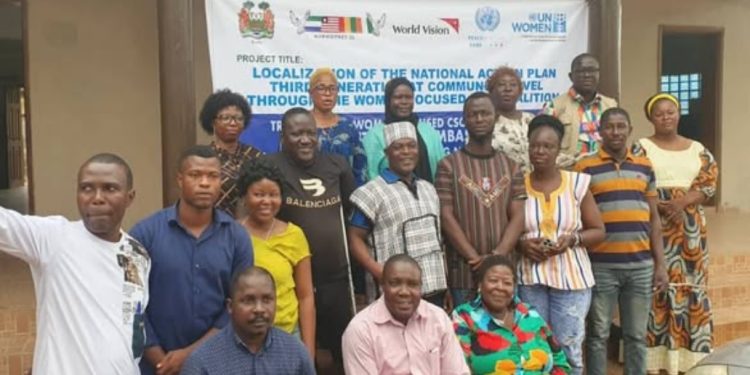The Mano River Women’s Peace Network (MARWOPNET) has concluded a series of peacebuilding training sessions for 40 women-focused civil society coalition members in Makeni and Freetown. The initiative, supported by the United Nations Peacebuilding Fund (PBF) through UN Women, UNDP, and World Vision, aimed to reposition CSOS as key agents for sustainable peace, conflict prevention, and the promotion of women’s participation in governance and security across Sierra Leone.
Rooted in a historic joint peace initiative in May 2000 by women of Guinea, Liberia, and Sierra Leone, MARWOPNET has since grown into a sub-regional force for peace, collaborating with governments and international bodies to promote a culture of peace and sustainable development across the Mano River Basin.
The recent training under the PBF-funded programme “Localisation and Working Together for Peace: Repositioning Women-Focused CSOS for Sustainable Peace in Sierra Leone” focused on enhancing the capacity of community-based organisations to implement, monitor, and report on the Sierra Leone National Action Plan III (SILNAP III) for Women, Peace, and Security.
According to Mrs. Rosaline McCarthy, the National Focal Person for the Mano River Women Peace Network, MARWOPNET, and one of the lead trainers, the training curriculum was designed to be practical and empowering. “We emphasised community-based mediation, conflict early warning systems, and the use of SILNAP III as a framework for action. She said that the goal is to ensure that CSOS are not just passive observers, but active peace agents in their districts,” she said.
“Peacebuilding must be embedded in the community. We walked participants through case studies of how local peace committees and CSOS can prevent violence through engagement, mediation, and partnerships with chiefs, police, and youth,” she explained.
Trainer Madam Marian Samu, who also serves as Chairperson of the National Commission for Democracy, led sessions on women’s leadership in peacebuilding and noted, “We explored strategies to mainstream women’s voices in traditional and formal peace processes. When women are at the table, solutions are more inclusive and sustainable. Our CSO coalition members now have tools to engage meaningfully in dialogue, prevention and advocacy.”
Lolo Yeama Sarah Thompson-Oguamah, a media and gender expert, facilitated sessions on monitoring and reporting mechanisms and highlighted the significance of data and documentation. “To hold stakeholders accountable, we must be able to document conflict incidents, human rights violations, and the peace actions we are taking. We introduced reporting templates aligned with Silnap III indicators,” she said.
The training targeted members from Karene, Bombali, Kono, Pujehun, and Western Area Rural and Urban districts, which have been identified as priority zones for conflict mitigation and national cohesion interventions.
Sub-regional Vice President of the Mano River Women’s Peace Network, Hannah Mallah, emphasised the long-term vision of the initiative. “This is more than a training – it is an investment in grassroots leadership for peace. We believe these women-focused CSOS can collectively shift the narrative and create safer spaces for women and girls. Our coalition will continue to grow as a unified force for change,” she stated.
MARWOPNET is a lead advisory agency under the PBF programme. It will continue supporting the national executive and district chapters in scaling peacebuilding activities, coordinating advocacy, and strengthening collaboration with government and international stakeholders.
The initiative is directly aligned with key global and national frameworks including the Sustainable Development Goals (SDGs) – specifically Targets 5.1 (end all forms of discrimination against women and girls), 5.2 (eliminate violence against women), 16.1 (reduce violence everywhere), 16.6 (effective, accountable institutions), and 16.7 (inclusive, participatory decision-making) – as well as the Government of Sierra Leone’s Medium-Term National Development Plan (MTNDP).
As the programme progresses, the coalition is expected to emerge as a strong and independent structure that can prevent conflict, drive mitigation efforts, and champion inclusive peace processes, particularly for women and girls, in every district nationwide.











